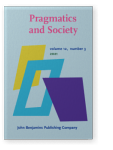Disagreement realizations in Arabic
Evidence from the University of Jordan
This paper examines disagreement strategies employed by speakers of Jordanian Spoken Arabic (JSA) with a view to finding out whether variables like gender and social status affect the linguistic choices and disagreement strategies they employ. The subjects are 28 Jordanian Arabic-speaking students at the University of Jordan. The researchers analyze the students’ interactional recorded responses to a set of stimuli included in an oral (recorded) discourse completion task (ODCT) prepared for this purpose. The ODCT comprises six scenarios in which the respondent is requested to disagree with two peers, two higher-status interlocutors and two lower-status interlocutors. The findings show that male and female subjects’ disagreement strategies tend to be influenced by the topic under discussion rather than by the gender and status of their interlocutor. However, some topics are found to be more provocative to females than to males.
Article outline
- 1.Introduction
- 2.Methodology
- 3.Results and discussion
- 3.1Disagreement strategies
- 3.1.1Non-confrontational disagreement strategies
- 3.1.2Confrontational disagreement strategies
- 3.2Status and the choice of disagreement strategy
- 3.2.1Disagreement with equals
- 3.2.2Disagreement with higher-status interlocutors
- 3.2.3Disagreement with lower-status interlocutors
- 3.3Gender and the choice of disagreement strategy
- 3.3.1Gender and disagreement strategies in terms of word count
- 3.3.2The role of gender in determining the preferred disagreement strategy
- 3.3.2.1Disagreement with an equal status interlocutor
- 3.3.2.2Disagreement with a higher status interlocutor
- 3.3.2.3Disagreement with a lower status interlocutor
- 4.Conclusions
-
References
References (19)
Abuarrah, Sufyan, Katja Lochtman, and Madeline Lutjerhams
2013 “
Cross Cultural Pragmatics Requests’ Use of Strategy and Level of Directness in Palestinian Arabic and British English.”
An – Najah University Journal for Research 27 (5): 1109–1144.

Al-Gahtani, Saad, and Carsten Roever
2015 “
The Development of Requests by L2 Learners of Modern Standard Arabic: A Longitudinal and Cross-Sectional Study.”
Foreign Language Annuals 48 (4): 570–583.


Al-Issa, Ahmad
1998 “
Sociopragmatic Transfer in the Performance of Refusals by Jordanian EFL Learners: Evidence and Motivating Factors.” PhD diss., Indiana University of Pennsylvania.

Brown, Penelope, and Stephen Levinson
1987 Politeness: Some Universals in Language Usage. Cambridge: Cambridge University Press.


Chojimah, Nurul
2015 “
Refusal and Politeness Strategies in Relation to Social Status: A Case of Face-threatening Act among Indonesian University Students.”
Theory and Practice in Language Studies 5 (5): 906–918.


Fraser, Bruce, and William Nolen
1981 “
The Association of Deference with Linguistic Form.”
International Journal of the Sociology of Language 1981 (27): 93–110.


Glaser, Karen
2009 “
Acquiring Pragmatic Competence in a Foreign Language – Mastering Dispreferred Speech Acts.”
Topics in Linguistics (4): 50–57.

Guodong, Liang, and Han Jing
2005 “
A Contrastive Study on Disagreement Strategies for Politeness between American English and Mandarin Chinese.”
Asian EFL Journal 7 (10): 1–12.

Istifçi, Ilknur, and Yunusemre Kampusü
2009 “
The Use of Apologies by EFL Learners.”
English Language Teaching 2 (3): 15–25.


Koczogh, Helga
2012 “
The Role of Gender in Verbal Disagreement: A Study of Disagreement Strategies Employed by Hungarian Undergraduate Students.”
Gender Studies 11 (1): 233–244.


Kreutel, Karen
2007 “
I’m not Agree with you.” ESL Learners’ Expressions of Disagreement.”
Teaching English as a Second or Foreign Language 11 (3): 1–35.

Leech, Geoffrey
1983 Principles of Pragmatics. London: Longman.

Locher, Miriam
2004 Power and Politeness in Action: Disagreements in Oral Communication. Berlin: Mouton de Gruyter.


Maiz-Arevalo, Carmen
2014 “
Expressing disagreement in English as a Lingua Franca: Whose Pragmatic Rules?”
Intercultural Pragmatics 11 (2): 199–224.


Morkus, Nader
2009 “
The Realization of the Speech Act of Refusal in Egyptian Arabic by American Learners of Arabic as a Foreign Language.” PhD diss., University of South Florida.

Muntigl, Peter, and William Turnbull
1998 “
Conversational Structure and Facework in Arguing.”
Journal of Pragmatics 29 (3): 225–256.


Searle, John
1969 Speech Acts: An Essay in the Philosophy of Language. Cambridge: Cambridge University Press.


Wierzbicka, Anna
1985 “
Different Cultures, Different Languages, Different Speech Acts: Polish vs. English.”
Journal of Pragmatics 9 (2): 145–178.


Cited by (1)
Cited by 1 other publications
Hamdan, Hady J., Hanan Al-Madanat & Wael Hamdan
2022.
Connotations of Animal Metaphors in the Jordanian Context.
PSYCHOLINGUISTICS 33:1

This list is based on CrossRef data as of 5 july 2024. Please note that it may not be complete. Sources presented here have been supplied by the respective publishers.
Any errors therein should be reported to them.
